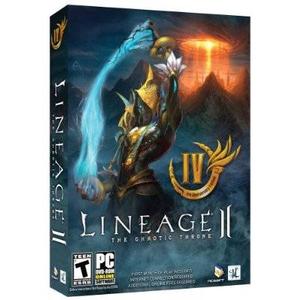Legal frontiersMan addicted to video games successfully challenges end-user agreement
A Hawaii man who sued a company over his crippling addiction to the computer game Lineage II — he claimed that his compulsive urge to play the game caused him to sink more than 20,000 hours into it — has managed to defeat the end-user agreement that said he had no right to bring the case to begin with; the decision may have lasting significance in the software license wars

The Lineage II package // Source: wordpress.com
A Hawaii man who sued a company over his crippling addiction to the computer game Lineage II has managed to defeat the end-user agreement that said he had no right to bring the case to begin with.
Craig Smallwood sued Lineage II maker NC Interactive late last year, claiming that his compulsive urge to play the game caused him to sink more than 20,000 hours into it. As a result, he had to be hospitalized and continues to suffer extreme and serious emotional distress and depression that requires treatment and therapy three times a week, according to court documents.
Dan Goodin writes that his lawsuit, filed in federal court in Hawaii, accuses the game maker of failing to warn him of the dangers of the game and then locking him out of his three accounts with no warning. Causes of action include misrepresentation, unfair and deceptive trade practices, defamation, and intentional infliction of emotional distress.
NC Interactive has responded the way most software companies and online services have for more than a decade: it argued that the claims are barred by its end-user license agreement (EULA), which in this case capped the company’s liability to the amount Smallwood paid in fees over six months prior to his filing his complaint)
One portion of the EULA specifically stated that lawsuits could only be brought in Texas state court in Travis County, where NC Interactive is located. Another section read:
12. Limitation of Liability * * * IN NO EVENT SHALL NC INTERACTIVE … BE LIABLE TO YOU OR TO ANY THIRD PARTY FOR ANY SPECIAL, INCIDENTAL, CONSEQUENTIAL, PUNITIVE OR EXEMPLARY DAMAGES … REGARDLESS OF THE THEORY OF LIABILITY (INCLUDING CONTRACT, NEGLIGENCE, OR STRICT LIABILITY) ARISING OUT OF OR IN CONNECTION WITH THE SERVICE, THE SOFTWARE, YOUR ACCOUNT OR THIS AGREEMENT WHICH MAY BE INCURRED BY YOU . . .
Goodin notes that more often than not, this is where cases such as these end. User sues company, the company cites EULA barring such lawsuits, the judge grants company’s motion to dismiss.
The judge in this case, U.S. District Judge Alan C. Kay, noted that both Texas and Hawaii law bar contract provisions that waive in advance the ability to make gross-negligence claims. He also declined to dismiss Smallwood’s claims for negligence, defamation, and negligent infliction of emotional distress (see a .pdf of the decision is here).
As Freedom to Tinker blogger Steve Roosa writes, the decision “may achieve some lasting significance in the software license wars.” For twenty years, the software and online user “has been dying a slow death under the decisional law, with software license agreements routinely interpreted in favor of software companies on any number of issues.”
Goodin concludes: “It’s always encouraging to see a decision that smacks a mighty Goliath, though one can’t help regretting that this one seems to favor a David who, by his own admission, is no longer able to dress, bathe, or communicate with family and friends as a direct result of his use of Lineage II.”
